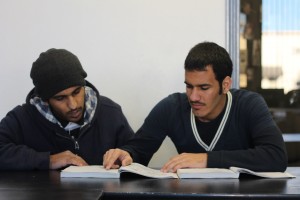
International students face a number of challenges upon leaving their home countries to attend BYU, including homesickness and a certain level of culture shock.
But many students find it particularly frustrating that other students feel these students’ English skills are a representation of underperformance.
Miguel Frias, a junior from Mexico who is studying international relations, said he has felt excluded in class discussions and in interacting with classmates.
“I felt many times that some classmates tried to avoid me, I think because of my accent, and they think I have a limited vocabulary and grammar,” Frias said. “They don’t think I can achieve nice work.”
These students typically have expressed concerns when working with American students in group projects.
David Godoy, a senior from Brazil who is studying political science, said he had concerns in group projects and discussions.
“I have a hard time in group projects because I feel they don’t value my opinion,” Godoy said.
Miles Ogden, an international student advisor who works in the international student office, said it is hard to quantify it, but he has heard some concerns from international students who were struggling in their interactions with native English speakers.
“The issue for me is more of a mistaken idea some American students have that if somebody speaks with an accent, they don’t understand well,” Ogden said.
The current 1,800 international students at BYU went through the same application process as Americans, plus some additional steps. International students are required to take an English proficiency exam, send high school transcripts to an organization that will evaluate and send them to BYU, and show a proof of financial support.
“What we see as advisers here is that international students have had to overcome such tremendous obstacles to get here,” Ogden said. “They certainly are not any less intellectually or in any other way than English-speaking students.”
Ogden also said it is not something exclusive to international students. He said anyone who is different can face the challenge of fitting in.
“It depends on the degree that people allow themselves to be open-minded,” Ogden said. “We need to stop to think about the crazy assumptions we make that have no meaning and no validity and that impact others in a harmful way.”
Robert Wakefield, a professor in the Communications Department, said they never performed any sort of research on the topic, but he senses, with other professors, that international students struggle.
One reason could be cultural differences. According to Wakefield, the way American students go through school in the U.S. is different from the process in many other countries. In the U.S., students are encouraged to talk out in class, so it’s common to see Americans raising hands and making comments. On the other hand, students from many other countries are taught to listen and take notes while their professor reigns supreme.
“Some Americans think international students are not so smart because they never say anything in class, and that is not the case; that is a cultural thing,” Wakefield said.
Another reason Wakefield gave is that students at BYU want the best in writing and other aspects. In group projects, because BYU students want the best grade, they doubt international students can do a quality job, and they give a small portion of the project to them.
“Anybody who comes and gets a college degree in a second language, even if it’s English that is more universal, that takes a lot of work and a lot of intelligence, and we don’t sometimes give credit for them,” Wakefield said.
Ogden said it is hard to know how much of this difficulty has to do with language barriers and with personality.
“A shy person will be shy in any language,” Ogden said.
To overcome these challenges, Ogden said international students need to be assertive and also patient with those who face stereotypes. Everyone is a foreigner somewhere, so there is almost always a stereotype connected to a person who is from another nation.
Wakefield said it takes sensitivity from the professors to recognize differences in the classroom and make accommodations so an international student can feel comfortable.
“It takes patience for the international students because they are dealing with people who just don’t know they are capable of performing hard tasks,” Wakefield said. “It also takes patience, too, for Americans to deal with differences.”
He said international students need to get out of their comfort zones and speak up to show they can contribute. Also, everyone needs to be empathetic.
“It is also important in intercultural interaction to have empathy and be able to put ourselves in the shoes of others,” Wakefield said. “That goes both ways.”




